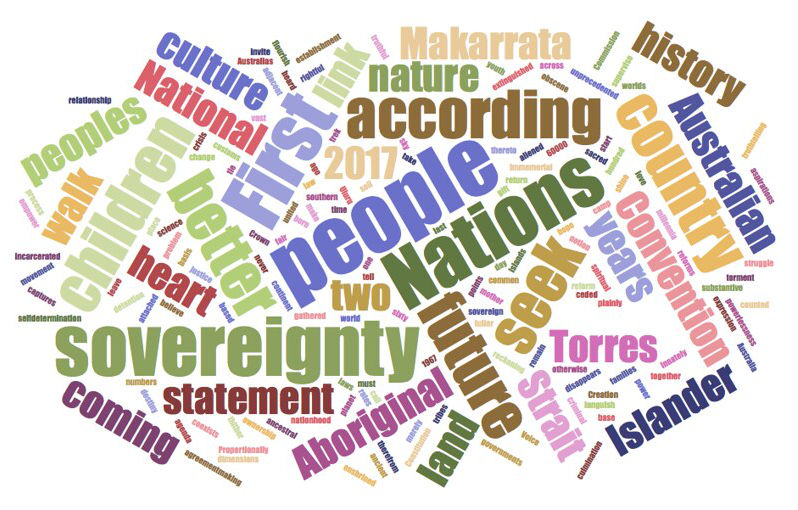Death and resurrection: history and the Voice to Parliament
April 10, 2023
All history is politics, and every politics is a future. The proposed Indigenous Voice to Parliament is part of a collection of actions seeking to hold colonial history and post-colonial future together, and so to propose a new Australian polity.
Australian colonial history is painful, and our natural aversion to pain makes the appropriate mode of its contemporary reception unclear. The culpability and the innocence of the non-indigenous majority, which profits today from colonial history, are contested. Is this majority today responsible for the past or only for the present and the future? Confusion about how to handle the history and the implied guilt which comes with truth-telling compromises the goodwill of many Australians, causing them to want simply to leave the past behind. It isn’t easy to hear that our history means our society is not a level playing field and that a few have paid a great price for the many. And so it can look like indigenous people already get more from Australias prosperity than the rest of us in terms of special consideration and concessions. How much more are we going to have to give?
This expresses a fear that the past, now present to us in contemporary claims for indigenous influence, will have too powerful a grip on everyones future. The purpose and limits around the Voice are now clearly stated. But the heart-problem of the pasts claim on us remains, now embodied in the political other. This is the problem of Sartres hell (other people) and, inverted, of Hartleys the past is a foreign countrywhere things are done differently: to do it differently today requires an uncomfortable revisiting of the past in the political realities of todays indigenous people, and we dont want that.
An unexpected source for reflection on these dynamics is John the Evangelists resurrection appearance story in John 20.19-31, heard in many Christian churches the Sunday following Easter. This is best known for the figure of Doubting Thomas, whose companions have testified to the impossible: they have seen the dead Jesus, alive once more. Thomas doubt was surely warranted, and even invoking a miracle story today attracts its own incredulity given deep modern scepticism about such things. The miracle, however, is not the now-alive of a once-dead, as Thomas very specific testing of the unbelievable claim indicates: let me see and touch the scars of the crucifixion. Oddly, the test that Jesus is now alive is not whether Thomas matches an apparition to his memory of Jesus face or voice. Thomas wants to know, Is this the one who was crucified? He will know that Jesus is risen when he sees the marks of this dark history.
This matters because, within the biblical New Testament context, the resurrection of Jesus is not a nature miracle but a history miracle: it is about what the future looks like, not a claim that the naturally dead can be unnaturally un-deaded. The future we seek as a true and living human possibility bears the marks of the past. The purportedly risen and futuring apparition cannot be Jesus if it does not bear the scars of what was done to him.
Such a resurrection to a new future allows for no forgiving-and-forgetting, no Cant they just get over it?. It is noteworthy here that the Greek word for truth is altheia (the New Testament was written in Greek). Structurally, this is a negative word whose etymology suggests a root meaning of not-concealed, not-forgotten. Truth, not least the truth of our future together, has to do with not covering and forgetting. And this not-forgetting is more than cataloguing the past; it is being changed by what is remembered. Resurrection, on this accounting, is a transforming carrying-forth of the past rather than a forgetful, white-washing contradiction of it.
If there is anything in all this that even an open resurrected future doesnt leave behind the wounds of human contempt then it follows that we cant have a post-colonial future unmarked by the past, or a future just society unshaped by the particular injustices it has overcome.
Perhaps the success of the 1967 referendumcould be attributed to the human question wrapped up in the constitutional language. That question asked of the Australian non-indigenous majority something like, Can we affirm that Aboriginal and Torres Strait Islanders are Australians? The answer was an overwhelming, almost too straightforward, Yes. The challenge of the forthcoming referendum is that, again wrapped up in constitutional language, it asks that same majority something like, And can we love them, and the Voice be one form of that love?
Recognising the human other is relatively easy. Loving him, her, them is much harder, especially when they might have a claim against us, and were not sure what settling that claim will cost. The cost the Voice proposes is a seat at the table, the presence of yesterdays scars to shape our nations tomorrow.
All history is politics, and every politics is a future. The politics which casts a future forgetful of the past will likely lapse again into the fear and injustice of that past. The politics which resurrects the past and, from its scars, learns new ways of life together, opens up the possibility of a future of love and reconciliation. This, surely, is what the world needs now.
